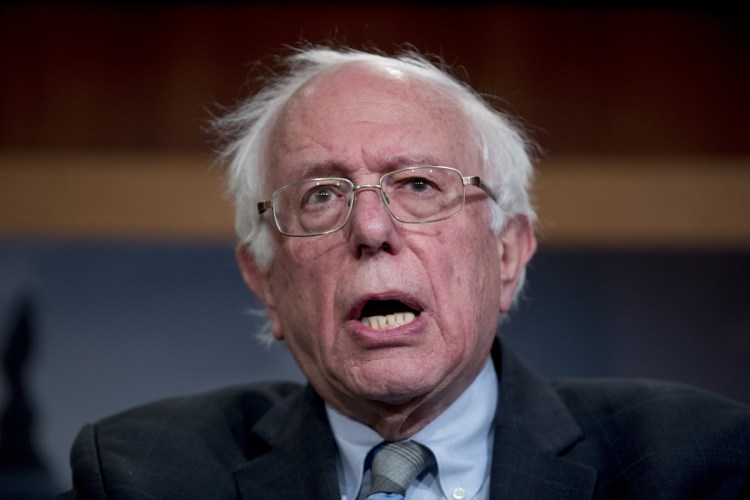MANCHESTER, N.H. — Sen. Elizabeth Warren, D-Mass., got a rousing reception from a ballroom filled with Democratic activists here Friday night, with multiple standing ovations and a lengthy photo line afterward. In a week when Sen. Bernie Sanders, I-Vt., joined the presidential race with a bang, it was the kind of reaction that pointed to the competition to come, here and elsewhere.
With the Democratic field already large and growing, handicapping the contest for the party’s 2020 nomination remains a fool’s errand. Most activists are eager to look but not yet ready to buy. But even at this early stage, it seems inevitable that Warren and Sanders will find themselves in direct competition as the campaign unfolds.
The two senators are fierce critics of what they call a rigged system, which they argue has hurt working and middle-class Americans. Both are scourges of big banks, big corporations and the billionaire class of political donors and influencers. As a result, they are seen – accurately or not – as having overlapping populist messages and therefore potentially overlapping constituencies.
NEW HAMPSHIRE PRIMARY
They share something else in common likely to bring them into conflict. As next-door neighbors to the state with the nation’s first presidential primary, they enjoy what historically has been a built-in advantage in New Hampshire. That means heightened expectations and the pressure to perform well here. Asked by reporters if she would win the primary here next year, Warren replied, “I’m sure going to try.” She hasn’t much choice.
Warren calls Sanders a friend. They go back many years, “long before I got involved in electoral politics,” she said in an interview before her speech. The two met at a dinner hosted by Rep. Rosa DeLauro, D-Conn. Warren recalled arriving armed with slides and data to illustrate the hollowing out of the middle-class. She said Sanders posted some of the material on his website and asked families to share their own experiences. She did some town halls with Sanders in Vermont and appeared on his radio show.
Today they have many of the same priorities: Medicare-for-all, for example, which Sanders championed in his 2016 campaign and that has been adopted by a number of candidates. She favors other initiatives that call for a more direct government role and more government spending. Her latest is a proposal to provide free or affordable child care to every family in the country, paid for by a 2 percent tax on families with wealth of $50 million or more. The proposal, which she unveiled last week, drew enthusiastic applause Friday night.
President Trump has branded the sum of what Democrats are proposing as socialism, a label he hopes will stick with an electorate still skeptical of Washington and the federal government. Warren is not worried. “Trump will say or do whatever he thinks helps Trump,” she said. “It doesn’t have to bear any relationship to reality. Our job as Democrats is to go out and fight for working people. To show that we understand and that we are committed to fighting for change.”
MARKETS WITH RULES
Sanders proudly labels himself a Democratic Socialist. Warren has resisted that description for her brand of populist politics. She has said she is not an advocate of government programs for the sake of growing government. She does not believe that government can always do better than the market. She says she believes in the power and value of markets, as long as they are fairly regulated. Which is why the agenda she has rolled out over the past months is heavy on rules and regulations. She would like to be seen as the cop on the beat.
“I can only describe myself,” she said when asked to explain how her brand of politics differs from that of Sanders. “I understand how markets work and when they work well how much value is created. I also understand that markets without rules are theft. It’s critical to get rules that are right and that make those markets fair for everyone and create real opportunities for all of our kids. That’s the heart of what I fight for.”
Many voters may find the distinctions she draws with Sanders, or with other rivals, difficult to parse. But Warren argues that what she is advocating embodies her life’s work – her experiences as a child in Oklahoma, as a young mother, a law student, a law professor, a public advocate, a senator and now a presidential candidate.
FIGHTING WORDS
She spoke Friday night to an audience of more than 900 activists at the McIntyre-Shaheen 100 Club Dinner, the New Hampshire party’s biggest fundraising dinner. She got the coveted platform because one of her advisers called state party chair Raymond Buckley late last year and asked. It is one small example of the aggressiveness with which she has begun her campaign.
That posture also applies to her message. She is leaned into the battle. On Friday night, she used the word “fight” or “fighting” at least a dozen times. Her announcement speech was similarly laced with references to fighting. When she was asked if she believed she needed something more aspirational to complement the fighting tone of her message, she immediately pushed back. “Oh, but I think that is aspirational,” she said. “Oh, goodness!”
Copy the Story LinkSend questions/comments to the editors.



Success. Please wait for the page to reload. If the page does not reload within 5 seconds, please refresh the page.
Enter your email and password to access comments.
Hi, to comment on stories you must . This profile is in addition to your subscription and website login.
Already have a commenting profile? .
Invalid username/password.
Please check your email to confirm and complete your registration.
Only subscribers are eligible to post comments. Please subscribe or login first for digital access. Here’s why.
Use the form below to reset your password. When you've submitted your account email, we will send an email with a reset code.